On December 4, 2023, the Natural Products Association (NPA) filed a lawsuit against the State of New York -- specifically Attorney General Letitia James -- arguing that the state's recently-enacted law that prohibits and restricts dietary supplement purchases is unconstitutional.[1] The case was dismissed on June 13, 2024.[2]
This article explains the law, summarizes the lawsuit, provides a quote from the Natural Products Association (New York has not yet commented), and was updated throughout the process.
Article/Lawsuit Updates:
- January 31, 2024 - New York's Attorney General office has responded with a "Motion for Pre-Motion Conference", explaining to the judge their criticisms against this suit and that they plan to file a motion to dismiss. See the Motion for Pre-Motion Conference section for a link.
- February 7, 2024 - The NPA has responded to the above letter with points as to why this case should continue. See the Motion for Pre-Motion Conference Response section.
- March 2024 - The NPA filed an amended complaint, satisfying requests from New York and adding an exhibit showing Kathy Hochul's veto of a similar bill from 2022. CRN also filed their own separate lawsuit on March 13. See the March 2024 section.
- April 2, 2024 - The NPA filed a second Amended complaint, including new arguments pertaining to members that will be harmed by this law (specifically NOW Foods and The Vitamin Shoppe). See the Early April 2024 section.
- April 22, 2024 - The New York law took effects after the CRN's request for a preliminary injunction in their case was denied by the judge on April 19th. See the CRN Injunction Denial section.
- June 13, 2024 - The New York Judge has dismissed the case, stating that the NPA lacked standing. See the details in the Case Dismissal section.
To take action: readers can head to the NPA's Action Center and leave a comment to New York.
About The New York Supplement Restriction Law
The bill was titled Assembly Bill A5610D[3] and was signed into law on October 25, 2023 by Governor Kathy Hochul.[4] It's set to be enacted as NY General Business Law § 391-oo on April 22, 2024.[5]
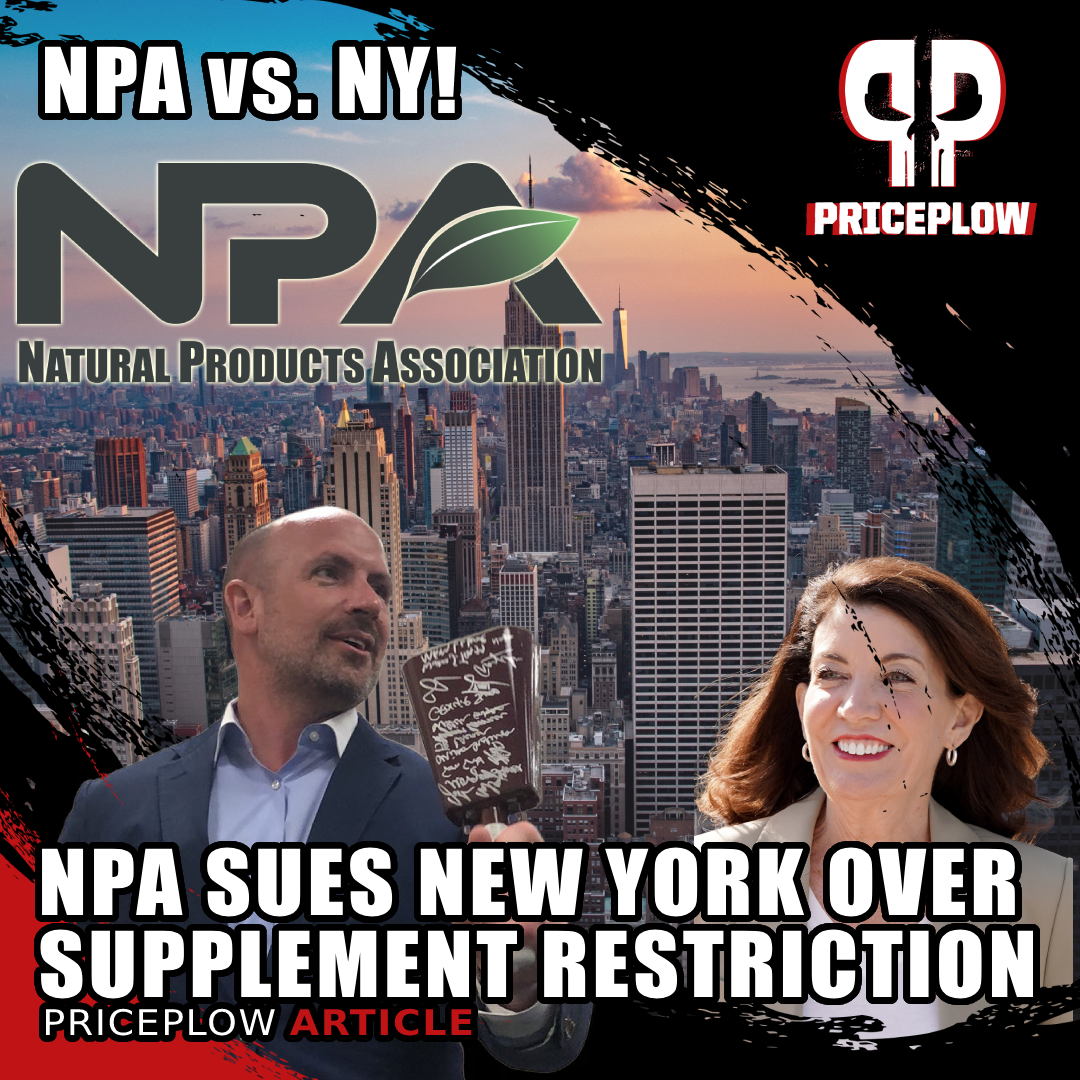
The Natural Products Association (NPA) has sued the State of New York (specifically attorney general Letitia James, not pictured here) over the state's unconstitutional restrictive dietary supplement law
The law minimizes public access to dietary supplements and, in certain situations, requires a prescription to access some products. Retailers' failure to comply would result in fines for each infraction.
Proof of age for weight loss or muscle building dietary supplements
More specifically, the law focuses on "dietary supplements for weight loss or muscle building".
It excludes protein powders, protein drinks, and foods marketed as containing protein -- unless it contains an ingredient other than protein that's considered a weight loss or muscle-building supplement.
Stores may not sell these supplements to any person under 18 years of age, and retail establishments must require proof of age for them. It also requires deliveries of such products to be signed for by adults with proof of ID.
Determination of products in these categories will be based upon several factors, such as if it implies reduced body weight, fat, appetite, or overall metabolism. It also specifically calls out any products with creatine, green tea extract, raspberry ketone, garcinia cambogia, and green coffee bean extract.[5]
Key points of the NPA's New York lawsuit
The case, filed in the Eastern District of New York, specifically names New York Attorney General Letitia James, since she's delegated as the authority of enforcing this law.[1] It begins by justifying the jurisdiction and validity of the lawsuit, as it seeks to redress the deprivation of rights of NPA's member parties.
The Federal Law that Preempts a State's Ability to Enforce This Law
It then provides background facts, explaining that dietary supplement manufacturing, use, and sales are regulated by the Food, Drug, & Cosmetic Act (FDCA).[1] It shows federal laws such as:
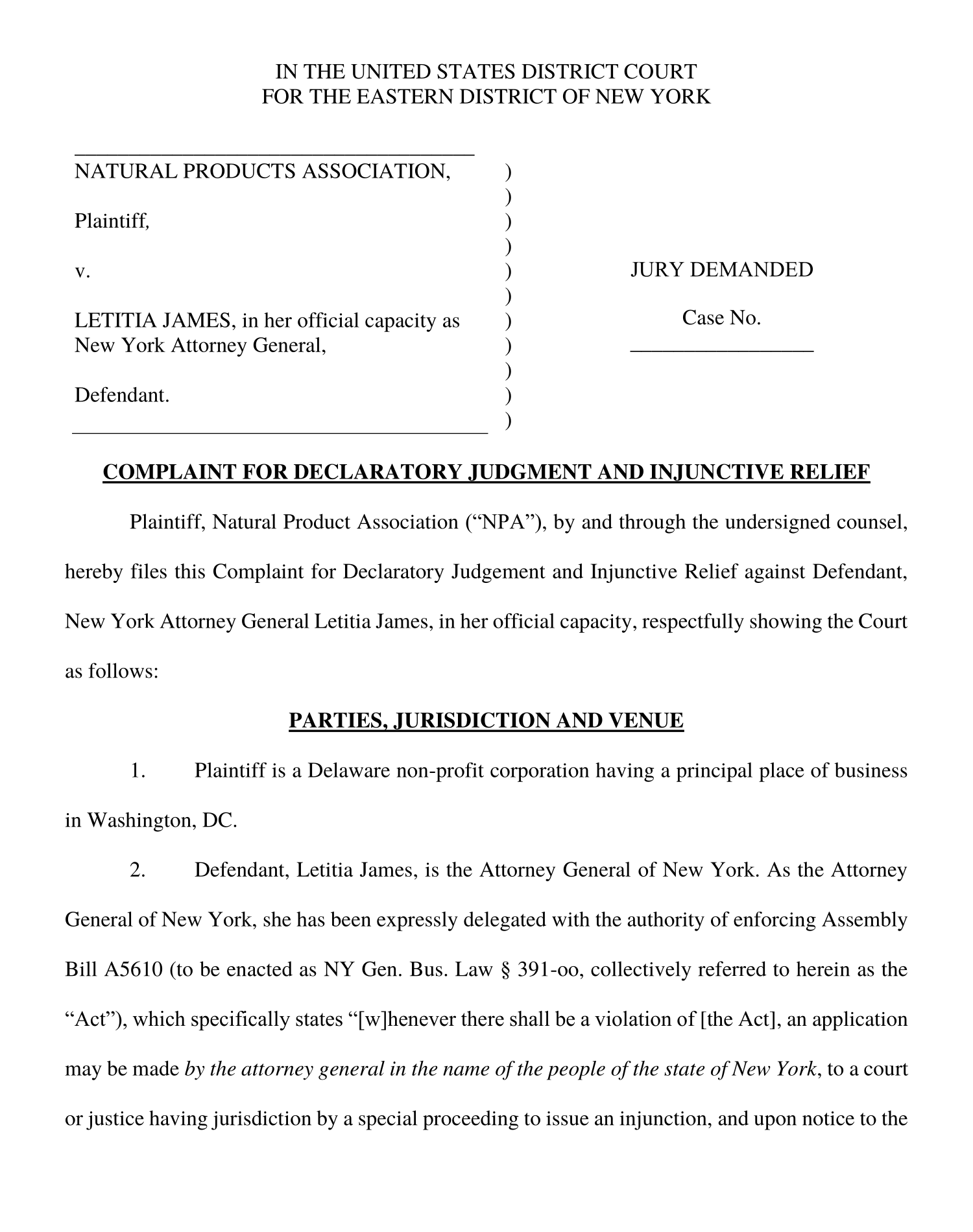
Does the state of New York have the ability to define dietary supplement categories and how they're sold, or is that exclusively reserved for the federal government?[1]
- 21 USC § 343-1(a)(5), which preempts state laws from requiring claims that different from FDCA's requirements.[6]
- 21 USC § 337(a), which prohibits the private enforcement of any of the provisions of FDCA -- "all such proceedings for the enforcement, or to restrain violations, of this chapter shall be by and in the name of the United States."[7]
So NPA is arguing that New York's law violates the federal government's exclusive enforcement authority on matters relating to the Food, Drug, & Cosmetic Act.
The NPA also argues that New York's Law is in conflict with other parts of the FDCA that define dietary supplements because the law attempts to make product definitions that conflict with the FDCA. Additionally, prescription and over-the-counter drugs could also be included in this law's enforcement, and those are not dietary supplements.
Further, the law attempts to define what constitutes "weight loss" and "muscle-building" supplements, but such definitions are also the responsibility of the federal government, not the states. This can lead to "improper arbitrary and capricious application of the law".[1]
An unconstitutional law
In short, point 39 quickly summarizes this for us:
"Since the FDCA and the Act are in direct conflict, the FDCA preempts the Act and the Act is unconstitutional."[1]
Seeking declaratory judgment and order of restraint
As such, in the lawsuit's prayer for relief section, the NPA seeks a declaratory judgment that the Act is unconstitutional on its face, and requests an order restraining the state from enforcing the law. They also request attorneys' fees.
Case Updates (through February 2, 2024)
-
January 31, 2024: NY AG Files Motion for Pre-Motion Conference
After requesting an extension until February 1, 2024,[8] Patricia M. Hingerton, New York's Assistant Attorney General, filed a request to have a pre-motion conference.[9] Inside, they stated that they're anticipating to file a motion to dismiss the case, and provided a few points of dissention with the lawsuit:[9]
- The lawsuit doesn't list members that will be harmed
- The suit is premature -- the harm hasn't (yet) taken place
- The law doesn't actually change labeling requirements per FDCA
- The law is not "impermissibly vague", which is a requirement from past case law.
The NPA stated that they were not suprised by these comments, and their response is updated below.
These points will either be debated in a meeting with the judge present, or through formal filings, but it shows us that a great way to get discourse started is sadly through a lawsuit like this.
-
February 7, 2024: NPA Files Response to NY's Motion for Pre-Motion Conference
Kevin Bell, counsel for the NPA, submitted a response to the judge regarding the above letter, explaining why the case should move forward.[10]
Using case law, he argues the following points:[10]
- NPA claims it does have standing, since their member organizations will immediately be affected by the law and are in the relevant market. They also argue that they don't have to "name names" of its members to satisfy requirements for standing.
- NPA states that the FDCA does preempt the Act because the Act would create a new category of dietary supplements, departing from FDCA. They later argue that it doesn't appropriately define "weight loss" or "muscle building".
- NPA insists that the act is vague and improper, especially in that it would improperly favor enforcement upon brick-and-mortar locations compared to online retailers. Online retailers, meanwhile, would have to submit to exorbitant delivery costs, and NPA alleges that there aren't good systems in place to ensure 18+.
Finally, the NPA objects to the 45-day timeline proposed by the NY AG, since that would cause harm to their members in the interim while waiting.
The judge's response is expected within a week or so - stay tuned to PricePlow.
-
March 1, 2024: NPA Files Amended Complaint
On March 1, 2024, NPA filed an amended complaint, providing more evidence and two additional exhibits.[11]
Join us, read our 'Lobby Day Training' article, and come ready for 2024's NPA Fly-In Day. Pictured: Mike with Senator Markwayne Mullin of Oklahoma from 2023's Fly-In Day
First, they include new arguments about over-the-counter and prescription diet pills such as Orlistat as well as drugs like Ozempic, Wegovy, and Mounjaru, which carry significantly greater health risks than natural dietary supplements.[11] Additionally, they provide the list of NPA members who will be adversely affected by the law.
Finally, they also include a previous veto from Kathy Hochul on a similar bill (Assembly Bill Number 431-C -- the version of the Act introduced but unpassed in a prior legislative session),[12] providing evidence that "It is apparent that the Act is the improper vehicle to achieve the stated ends."[11]
-
March 13, 2024: CRN Files Separate Lawsuit
On March 13, 2024, the Council for Responsible Nutrition (CRN), a separate lobby group in the dietary supplement space, also filed a lawsuit against New York.[13] This is a longer lawsuit that focuses more on a strategy to void for vagueness.
The CRN's general strategy seems to follow this approach:
On April 2, 2024, NPA filed a second amended complaint, this time naming specific members that will be harmed - NOW Foods and The Vitamin Shoppe. This is shown on Page 14 of the complaint.[14]
- Try to get thrown out by invalidating
- Else, get clarity
As opposed to the NPA's lawsuit, which was filed in the Eastern district, CRN's was filed in Southern district. This may prevent the two cases from being consolidated, at least until later on.
There are concerns that this presents a fragmented attack from the dietary supplement industry, and that legal funds should be pooled and preserved to combat future states' attacks.
CRN's case number is 1:24-cv-01881.
-
April 2, 2024: NPA Files Second Amended Complaint
On April 2, 2024, NPA filed a second amended complaint,[14] with some minor updates such as arguments that federal carriers do not have the facilities to check individuals' ages when products are shipped from outside of the state.
It also adds arguments for two specific members, NOW Foods and The Vitamin Shoppe, expressing how they will be directly harmed.[14]
-
April 22, 2024: Law Takes Effect after CRN Emergency Request for Preliminary Injunction Denied
On April 3, 2024, the CRN filed an emergency motion for an order to show cause for a temporary restraining order and preliminary injunction, seeking immediate relief ahead of the Law's effective date.[15] The court conducted a hearing on the motion on April 10th, and the CRN then amended their complaint to incorporate additional allegations,[16] as well as a supplemental letters regarding age verification and compelled speech.
This request was denied, and the judge's response was not exactly a pleasing one:[17]
"Plaintiff's substantial and inexcusable delay in moving for preliminary relief five months after the State was enacted in October 2023, erodes its claims of immediate, irreparable, and impending injury."[17]
...
"Plaintiff's unwarranted delay in moving for emergency preliminary relief further demonstrates that the purported compliance-related economic injuries are neither immediate or irreparable."[17]
This marks a major setback in the case -- potentially both cases -- as the law took effect just a few days later. The CRN has since filed a motion for clarification to understand a "clear reading" of the statute since nobody is sure what exactly is disallowed.[18]
-
June 13, 2024: Case Dismissed due to Lack of Standing
On June 13th, 2024, the case was dismissed, primarily due to the lack of standing for the NPA.[2]
The court determined that the NPA failed to demonstrate that its members had suffered a concrete / specific injury that was actual or imminent.
For an organization to have standing to sue on behalf of its members, it must show that its members would have standing to sue in their own right (or the interests it seeks to protect are germane to the organization's purpose) -- and neither the claim asserted nor the relief requested requires the participation of individual members in the lawsuit.
In this case, the court found that NPA did not meet the above criteria. The NPA didn't provide specific evidence showing that its members were directly harmed or faced an imminent threat of harm due to the New York statute. The affidavits submitted by NPA were deemed too vague, lacking concrete plans or details about how the statute directly affected its members' business operations.
Consequently, the court dismissed the action without prejudice for lack of subject matter jurisdiction. They denied NPA's motion for a preliminary injunction on the same grounds.
This terminates the case, but since it was dismissed without prejudice, the NPA could correct the issues and potentially file the case again in the future.
In case a new lawsuit is filed, you can sign up for alerts on PricePlow's Natural Products Association news page or in the widget at the bottom of this page.
Take Action Now!
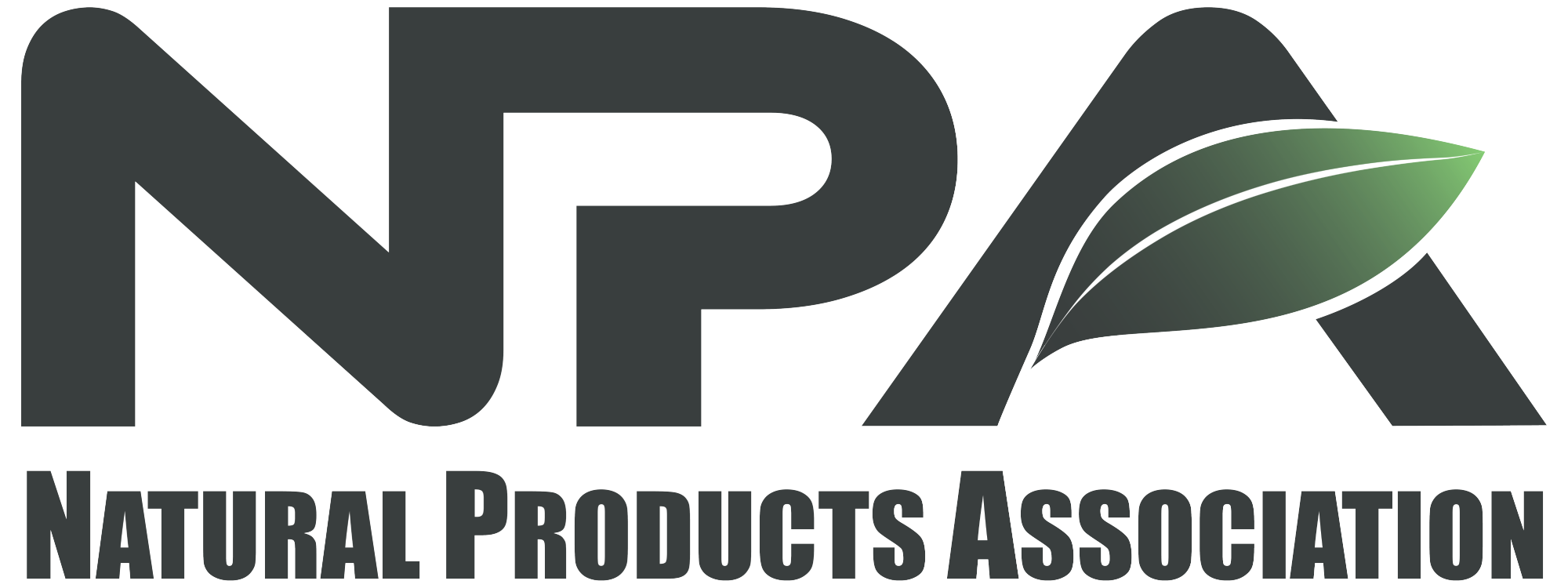
The Natural Products Association (NPA) is the nation's leading trade association for dietary supplements and natural health products. See the NPA's Action Center
To take action, readers can share this article and then head to the NPA's Action Center and leave a comment to New York. You can also share this image to your Instagram story and link to this page.
Join the NPA
Additionally, brands, manufacturers, and retailers can look to join the Natural Products Association to receive support from the leading trade association for dietary supplements and natural health products.
The industry is going to need to get used to these suits, as more states are looking to pass similar laws.
NPA's Dan Fabricant speaks out
Dan Fabricant, the Natural Products Association's President and CEO, released the following statement:
"Governor Hochul's decision to flip-flop and cave to anti-supplement charlatans is evidence she cares more about politics than New Yorkers ability to stay healthy.
Team PricePlow flew into Washington DC for the Natural Products Association's 2023 Fly-In Day, recording a great tell-all podcast with NPA's CEO, Dan Fabricant, who tells us in PricePlow Podcast Episode #100 why we should be involved in our industry's politics.
Not only is this unconstitutional, but this prohibition is a bad policy threatening the ability of nearly 80% of Americans to access wellness products they've relied on for their health routines. It also violates the U.S. Constitution because it hands the state's executive branch unfettered discretion to restrict access to dietary supplements and relies on an absurd enforcement mechanism to enforce compliance. We believe the court will recognize the serious concerns raised and declare it unconstitutional."
-- Dan Fabricant, NPA President & CEO
You can learn more about Dan Fabricant in Episode #100 of the PricePlow Podcast, where he explains why everyone needs to get involved in their industry's political matters.
Request for comment out for Letitia James
We have reached out to the office of Letitia James for further comment, and will update this article if we receive one.
The background and basis of the law
The New York legislators who created this bill argued that these supplements lead to eating disorders. This has never been established -- not through correlation nor causation. There is zero data showing the likelihood of developing an eating disorder as a result of using weight loss products.
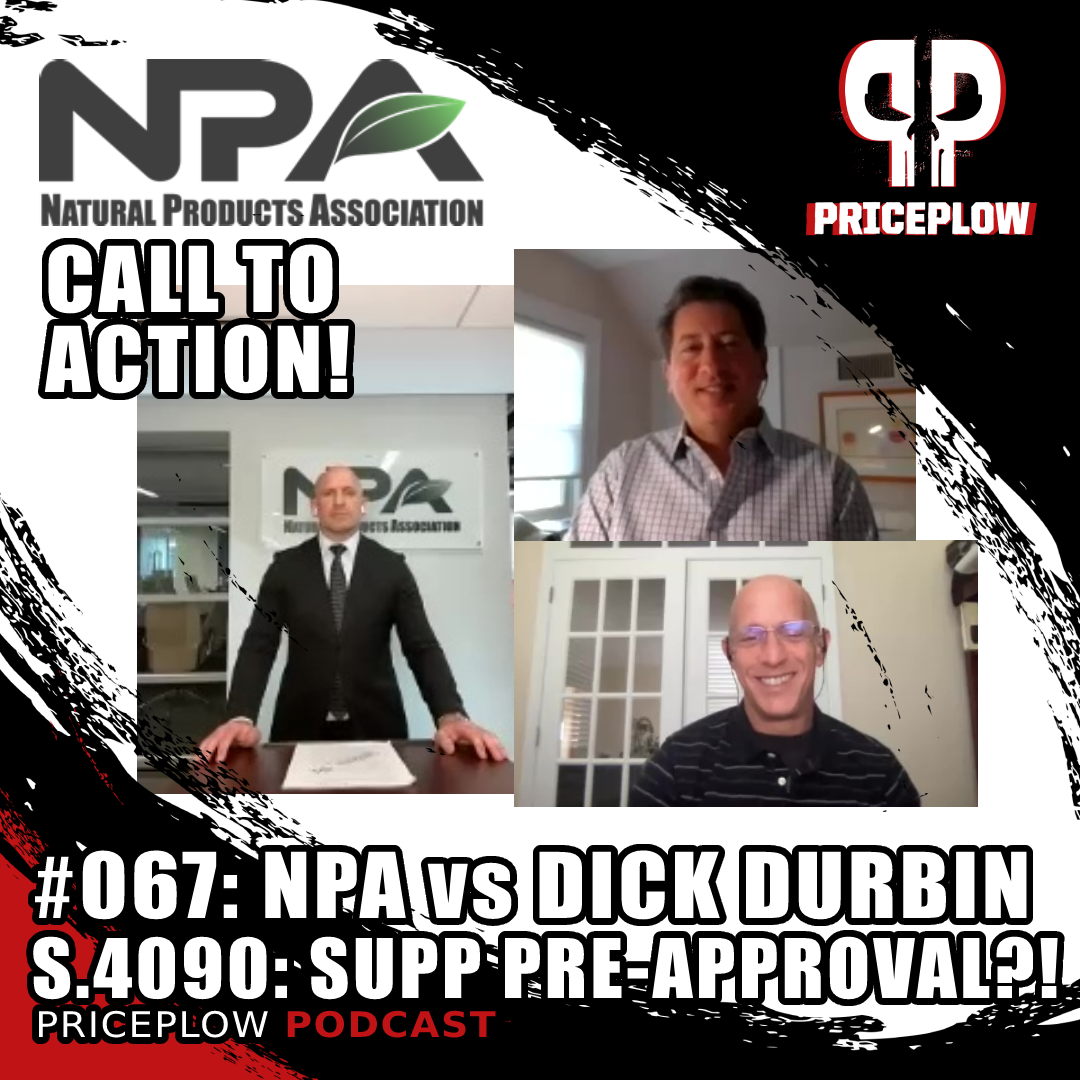
Previously on the PricePlow Podcast, the NPA successfully defeated a bill (S.4090) introduced by Senator Dick Durbin that would have required pre-approval from the FDA for all dietary supplements. Listen to it in Episode #067.
The lawsuit argues that such situations would be filed as adverse events (for which there have been none), and that, too, is under the purview of the federal government, not the states.
Instead, the argument that "fat burners lead to eating disorders" has seemingly been pushed for political grandstanding and headline-worthy clickbait. If we come across any research indicating a correlation or causation between supplements and eating disorders, we will post updates here.
The lawsuit was served by Kevin Bell and Matthew Zapadka of Arnall Golden Gregory (AGG),[19-21] one of NPA's Washington DC Law Firms. Their New York representation was Aaron Zerykier of Polsinelli PC, but he resigned from the firm and withdrew as an attorney just before the dismissal. It had a case number of 2:2023-cv-08912. The presiding judge was Hon. Joan M. Azrack.
Sign up for our NPA news alerts below:
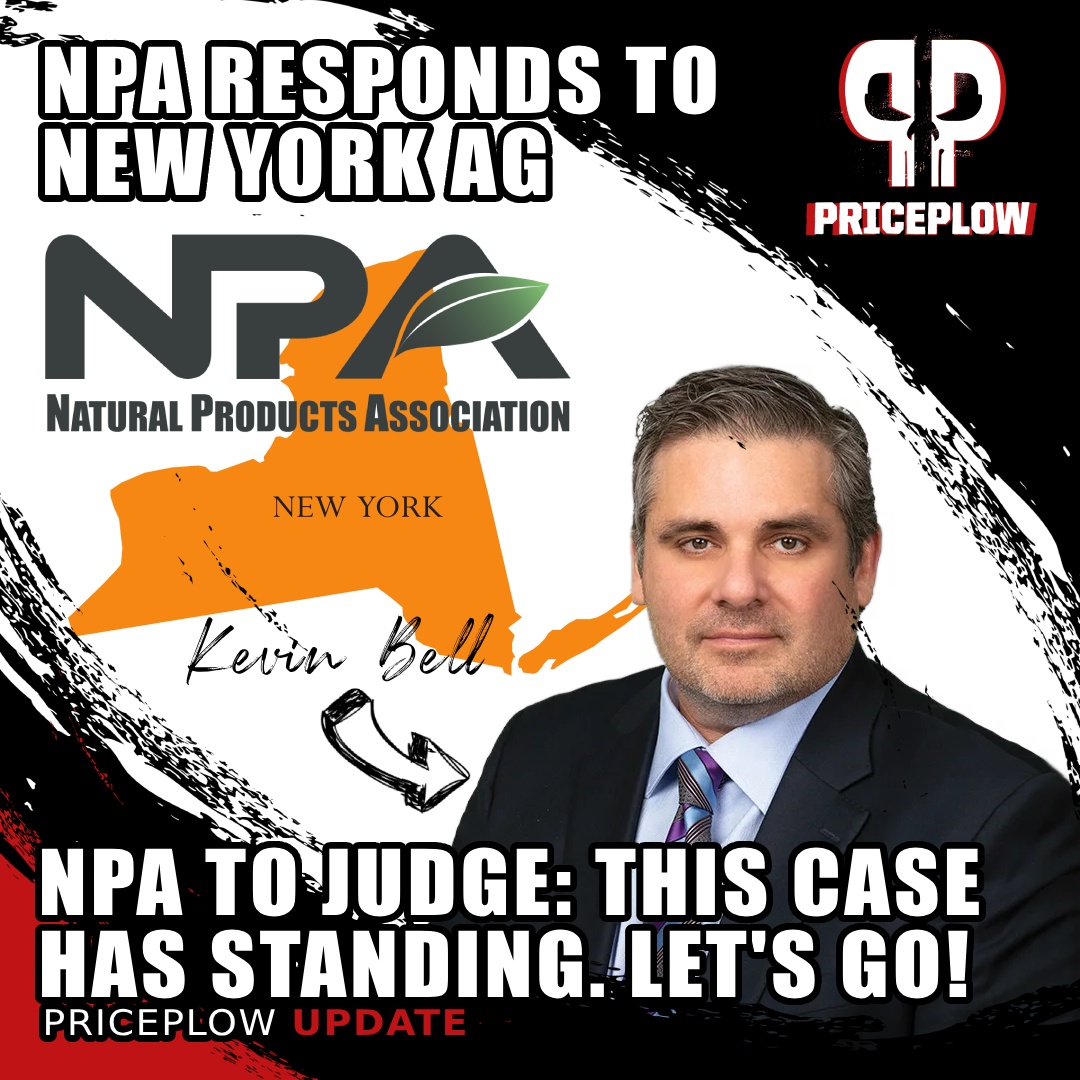

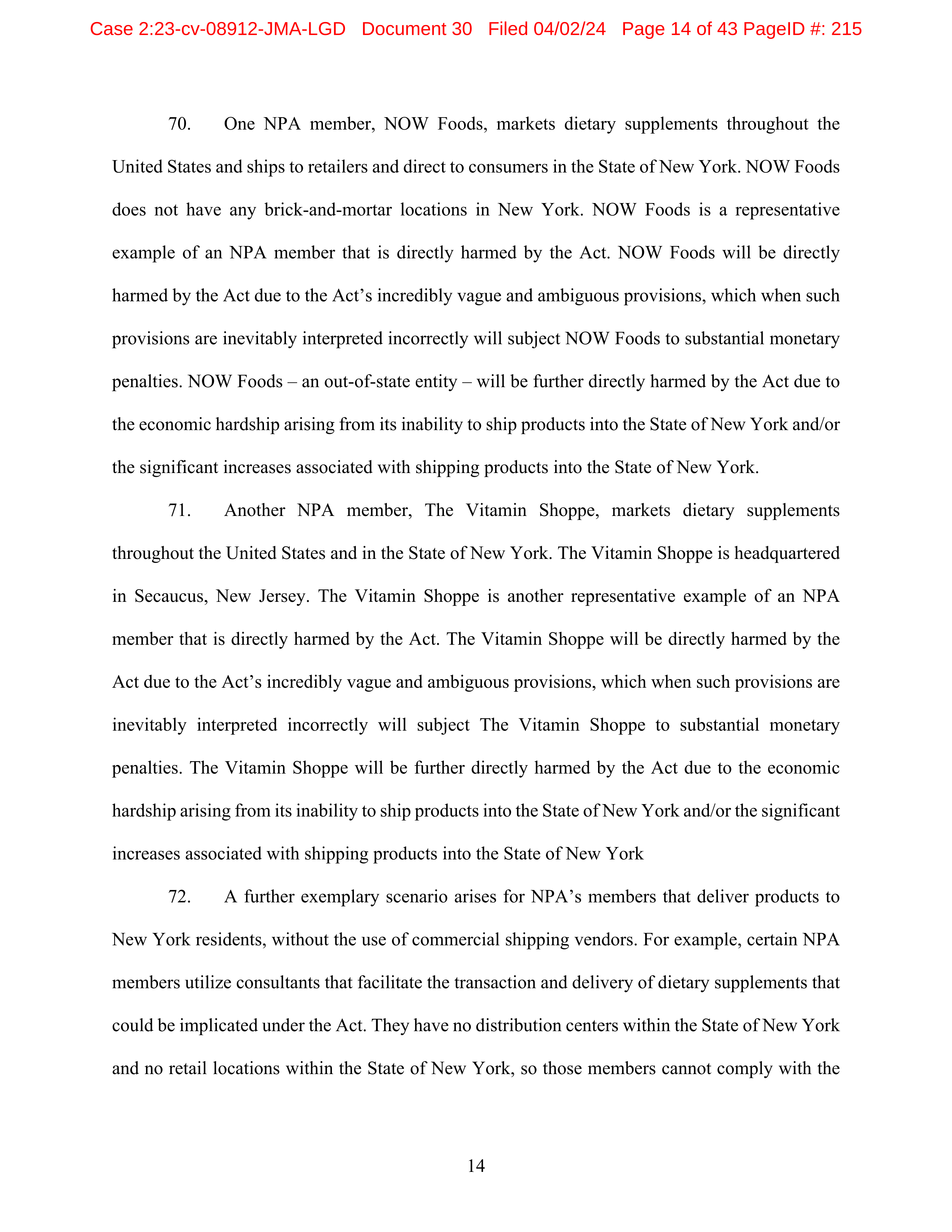

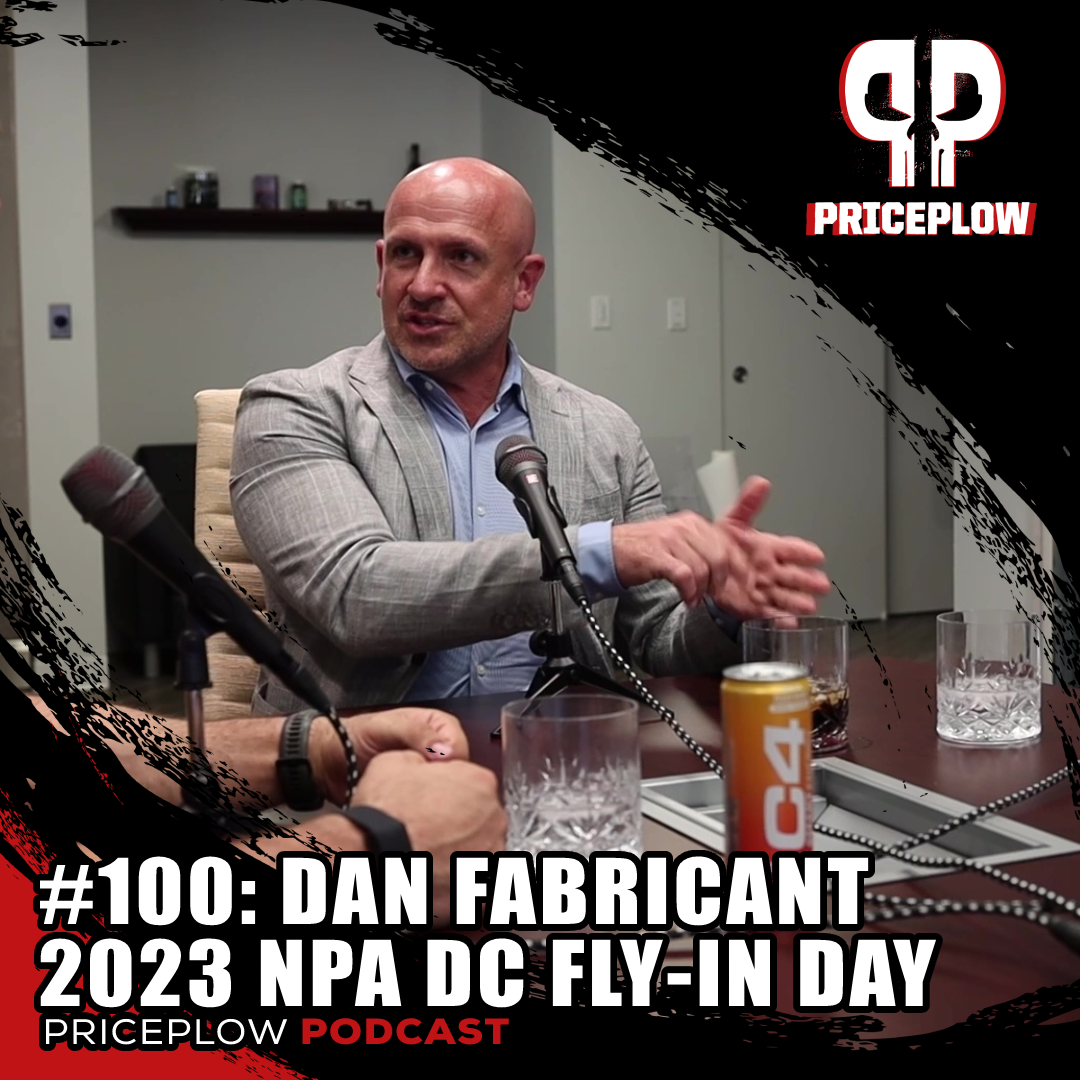


Comments and Discussion (Powered by the PricePlow Forum)